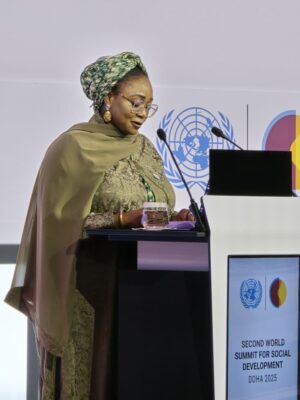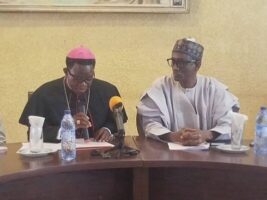Nigeria has unveiled a comprehensive social transformation agenda aimed at advancing inclusive development, poverty reduction, and digital equity at the Second World Summit for Social Development (WSSD) held in Doha, Qatar.
Delivering Nigeria’s statement on behalf of President Bola Ahmed Tinubu, the Minister of Women Affairs and Social Development, Hon. Imaan Sulaiman-Ibrahim, reaffirmed the nation’s commitment to people-centered governance and sustainable growth.
According to a statement by her Special Adviser on Media and Publicity, Jonathan Eze, the Minister said Nigeria’s vision for social development is anchored on the Nigeria Agenda 2050 and the Renewed Hope Agenda, both of which prioritize poverty eradication, human capital development, and inclusive growth.
“Nigeria fully aligns with the statement delivered on behalf of the African Group. Our vision for social development is guided by the Nigeria Agenda 2050 and anchored on the priorities of the Renewed Hope Agenda focusing on people-centered governance, poverty eradication, human capital development, and inclusive growth,” she stated.
Highlighting key reforms, Sulaiman-Ibrahim noted that the government has established Regional Development Ministries and Agencies across all six geopolitical zones to promote balanced territorial development, alongside Ward Development Initiatives designed to ensure that “no community is left behind.”
She also announced the institutionalization of the National Social Investment Programmes (NSIPs) through a standalone agency, providing millions of Nigerians with access to conditional cash transfers, youth employment opportunities, school feeding programmes, and enterprise support.
These initiatives, she said, are “triggering multidimensional prosperity anchored on a National Social Register.”
Read Also
As part of efforts to enhance governance efficiency and social inclusion, the Minister disclosed that Nigeria has launched an enhanced National Digital Identity Portal, which enables improved access to public services, ease of travel, and targeted delivery of social protection.
On youth empowerment, Sulaiman-Ibrahim highlighted the role of the Nigeria Youth Investment Fund (NYIF) and the Creative Economy Development Fund (CEDF) in driving innovation and entrepreneurship among young Nigerians, particularly women. She also cited government investments in Technical and Vocational Education and Training (TVET) and STEM education as part of a long-term strategy for inclusive economic growth.
READ ALSO: Nigeria To Host Category 2 UNESCO Media, Information Institute
In a stateent by the Special Adviser, Media & Publicity, Federal Ministry of Women Affairs and Social Development, Jonathan Eze, on Wednesday, November 5, the Minister further revealed that the administration is adopting a lifespan approach to social development, with initiatives such as Universal Child Grants, a National Council for Social Work, and full implementation of the Discrimination Against Persons with Disabilities (Prohibition) Act, 2018 through the National Commission for Persons with Disabilities.
Under the Renewed Hope Social Impact Intervention 774 (RH-SII774), she said, Nigeria aims to empower over 10 million women within five years, strengthen family systems, and institutionalize care structures through comprehensive social workforce reforms.
Sulaiman-Ibrahim added that the government is scaling up investments in primary healthcare, maternal and child health, early education, and clean energy access, while tackling climate change and promoting environmental sustainability.
“In Nigeria, inclusive social development is not an aspiration but an obligation,” she declared. “It demands shared responsibility, political will, and renewed multilateral cooperation.”
Reaffirming Nigeria’s commitment to the Doha Political Declaration and the 2030 Agenda for Sustainable Development, the Minister called for stronger international collaboration to ensure that “every woman, every child, and every family thrives in dignity.”
She concluded by urging nations to uphold social protection as a universal right, emphasizing that progress should be measured not only by economic growth but by “human resilience, gender equality, and collective well-being.”




